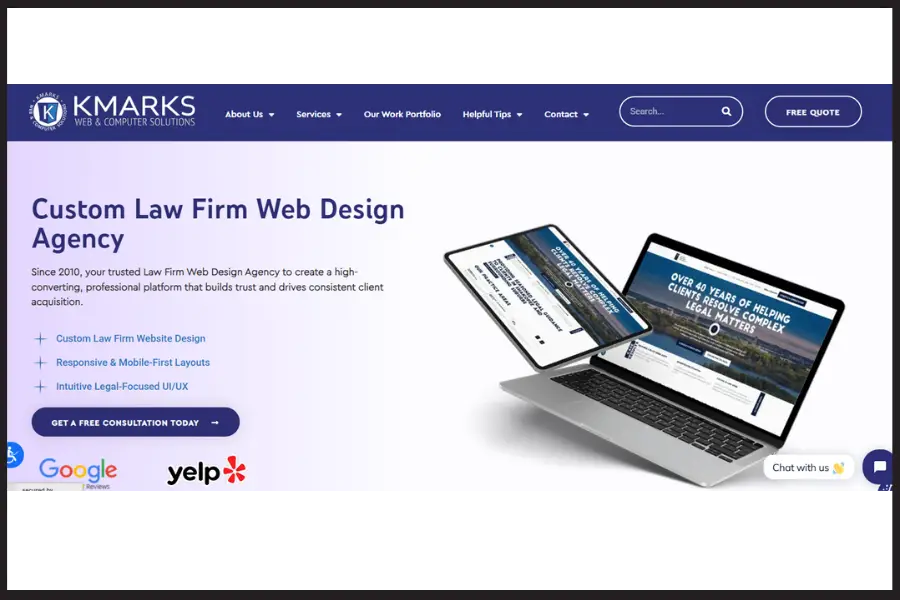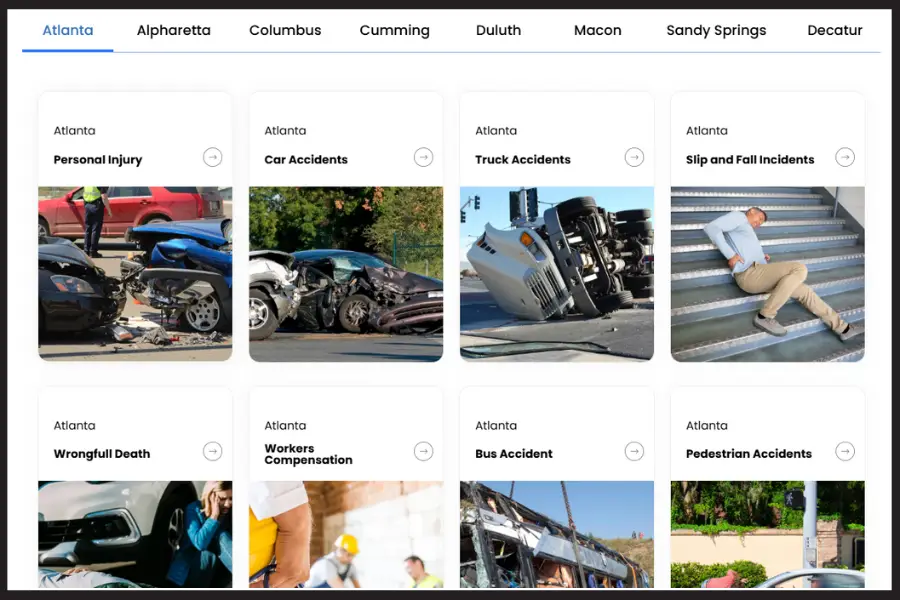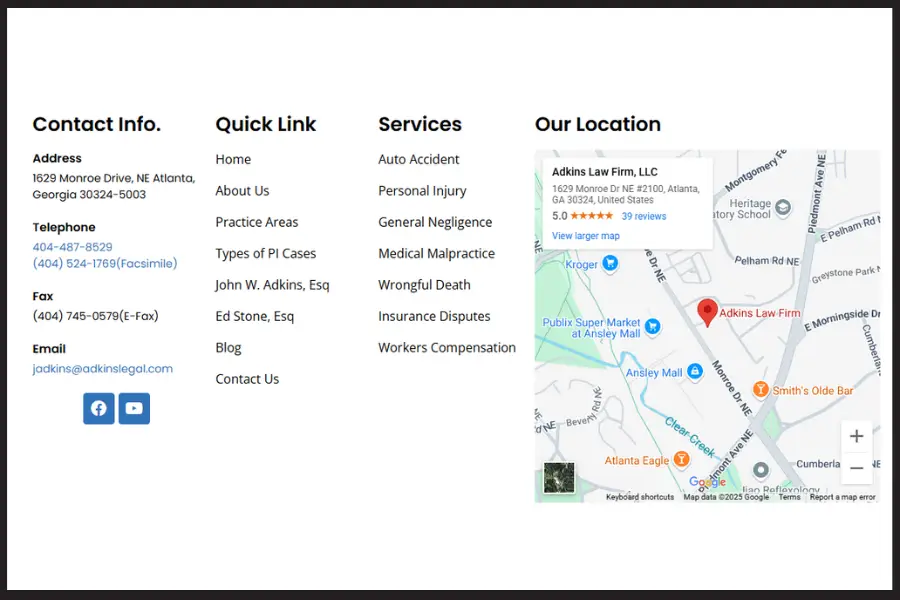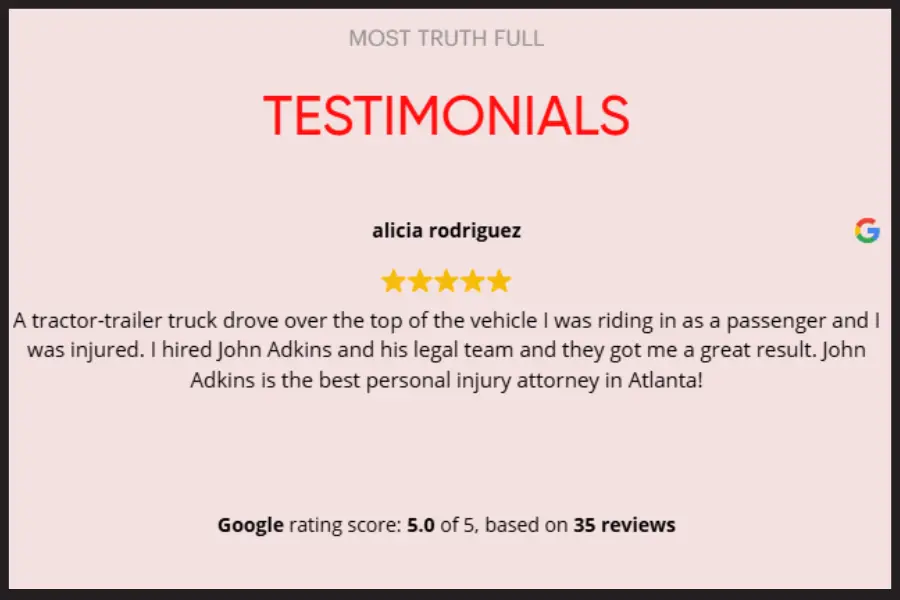Your law firm’s website is more than just a digital business card — it’s often the first point of contact a prospective client has with your firm. A well-designed, strategically built law firm website builds trust, establishes authority, improves SEO performance, and converts visitors into clients. But what exactly makes a law firm website effective?
In this guide, we’ll break down the top 10 essential features every law firm website should include — along with detailed explanations, best practices, and why each one matters.
1. Clear & Professional Branding
Why It Matters:
First impressions are critical. The moment a visitor lands on your site, they make judgments about your professionalism and credibility — often in under a second. Your branding should communicate trust, authority, and competence.
Key Elements to Include:
-
A professionally designed logo that reflects your firm’s identity.
-
A consistent color palette, typography, and imagery style.
-
A concise and memorable tagline (e.g., “Trusted Legal Counsel Since 1985”).
-
Photos of attorneys and office space to build familiarity and trust.
Pro Tip: Avoid generic stock photos. Use high-quality images of your real team whenever possible.
2. Easy Navigation & User-Friendly Design
Why It Matters:
Potential clients are often in distress or looking for quick answers. A confusing website structure or cluttered design can frustrate users and cause them to leave your site.
Best Practices:
-
Use a clean, intuitive menu structure with clearly labeled pages.
-
Include a search bar so users can find specific topics quickly.
-
Make sure important pages (like Practice Areas, About Us, and Contact) are accessible within one or two clicks.
-
Use clear call-to-action (CTA) buttons like “Schedule a Consultation” or “Call Now.”
Pro Tip: Design for mobile first — over 60% of users browse legal services on mobile devices.
3. Attorney Profiles and Bio Pages
Why It Matters:
Clients don’t hire law firms — they hire attorneys. Your lawyer bio pages should establish each attorney’s credibility, experience, and personality.
What to Include:
-
Full name, title, and professional headshot.
-
Summary of experience, areas of focus, and education.
-
Bar admissions, awards, and professional affiliations.
-
A brief personal story or quote that humanizes the attorney.
Bonus Tip: Use structured data (schema markup) to enhance bios for SEO and rich results in search engines.
4. Detailed Practice Area Pages
Why It Matters:
Potential clients are usually searching for help with a specific legal issue. Practice area pages help your firm show up in search results and guide users to the right service.
What to Include on Each Page:
-
A clear overview of the legal issue (e.g., “What is Personal Injury Law?”).
-
Types of cases you handle within that practice area.
-
What the legal process looks like.
-
Why your firm is uniquely qualified.
-
Testimonials, case results, and FAQ related to the practice area.
SEO Tip: Optimize each page with relevant keywords, internal links, and local modifiers like city or state names.
5. Secure and Accessible Contact Options
Why It Matters:
The main goal of your website is to generate leads. Make it effortless for visitors to contact you — and protect their privacy in the process.
Must-Have Contact Features:
-
Click-to-call phone numbers.
-
Contact form with custom fields.
-
Live chat or chatbot (optional, but powerful).
-
Office locations with embedded Google Maps.
-
Email addresses and business hours.
Privacy Tip: Make sure your contact forms are secure (HTTPS) and include a privacy disclaimer, especially if users are sharing sensitive legal information.
6. Client Testimonials and Reviews
Why It Matters:
Social proof plays a major role in decision-making. When potential clients read real experiences from others, it builds trust and credibility.
Best Practices:
-
Display reviews prominently on your homepage or service pages.
-
Include names, photos, or video testimonials if possible (with permission).
-
Regularly update testimonials to keep them fresh.
-
Consider integrating Google or Avvo reviews for authenticity.
Compliance Note: Follow your state’s bar association rules on using client testimonials in advertising.
7. Blog or Resource Center
Why It Matters:
A legal blog or resource center helps establish your authority, improves your SEO rankings, and educates your audience.
Content Ideas:
-
Answers to common legal questions (“What to Do After a Car Accident in Alabama”).
-
Updates on changes in laws relevant to your practice areas.
-
Tips, case studies, and news from your firm.
-
Guides (e.g., “How to Prepare for a Divorce Consultation”).
SEO Tip: Regular blogging with internal links and keyword-rich content helps you rank better and attract organic traffic.
8. Fast, Mobile-Friendly Performance
Why It Matters:
Speed and mobile usability directly affect user experience and SEO. A slow or poorly optimized site can cause users to bounce and Google to rank you lower.
Checklist for Performance:
-
Mobile-responsive design (test on multiple devices).
-
Optimized images and caching.
-
Minimal use of plugins and heavy scripts.
-
Load speed under 3 seconds.
-
Use Google’s PageSpeed Insights or GTmetrix to diagnose performance issues.
Accessibility Tip: Ensure your site meets WCAG accessibility guidelines to serve all users, including those with disabilities.
9. Legal Disclaimers and Privacy Policies
Why It Matters:
Law firm websites are subject to legal and ethical rules. A lack of appropriate disclaimers could lead to liability or disciplinary action.
What to Include:
-
Attorney Advertising Disclaimer: Especially if the site markets services across multiple states.
-
No Attorney-Client Relationship Disclaimer: Making it clear that submitting a form or contacting the firm doesn’t create a legal relationship.
-
Privacy Policy: Explaining how user data is collected and used.
-
Terms of Use: Optional but recommended for full coverage.
Pro Tip: Display disclaimers in the footer and on contact forms where applicable.
10. Conversion-Focused Design Elements
Why It Matters:
Even with great content, your website must be optimized to convert visitors into leads. Strategic design and copy can increase calls and consultations.
Features That Boost Conversions:
-
Sticky header with contact information.
-
Prominent CTAs above the fold (e.g., “Schedule Your Free Consultation”).
-
Trust badges and awards (e.g., “Super Lawyers,” “Best Law Firms”).
-
Exit-intent popups with offers or reminders.
-
Clear, benefit-driven language that speaks to the client’s pain points.
Bonus Tip: Use A/B testing tools to try different headlines, CTA button colors, and layouts to see what works best.
Final Thoughts
A high-performing law firm website isn’t just about looking good — it’s about building trust, driving traffic, and generating leads. By incorporating the features above, your site can become a powerful business development tool and a reflection of the professionalism your firm offers.
If you’re building or redesigning your law firm website, make sure these 10 essential features are part of your strategy. From technical performance to compelling attorney bios, every detail plays a role in attracting, engaging, and converting your visitors.
Partner With Experts Who Understand Law Firm Websites
Looking for a professional team to bring your law firm website to life? Kmarks Solutions specializes in digital marketing and web design for legal professionals. With a deep understanding of the legal industry, we build websites that not only look exceptional but are strategically designed to attract clients and grow your firm.
Why Choose Kmarks Solutions?
1. Custom website design tailored for law firms
2. SEO-optimized pages that rank and convert
3. Mobile-responsive, fast-loading performance
4. Ongoing support and maintenance
5. Legal-compliant design (ADA, disclaimers, and privacy)
Whether you’re a solo attorney or a multi-partner firm, we’ll help you create a digital presence that reflects your expertise and generates measurable results.
📞 Call Now: (334) 472-0686
📧 Email: support@kmarks-solutions.com
Let Kmarks Solutions transform your law firm’s website into your most powerful client-generating tool.






















